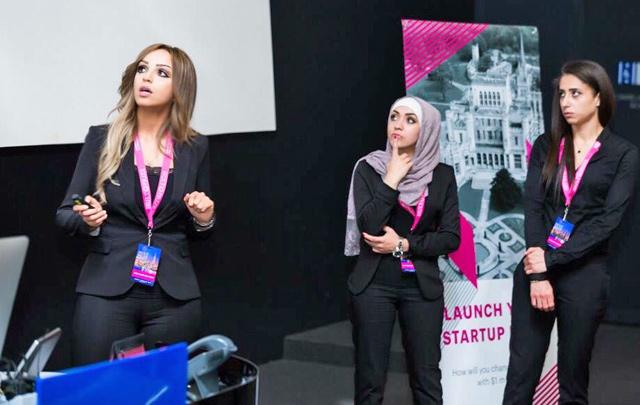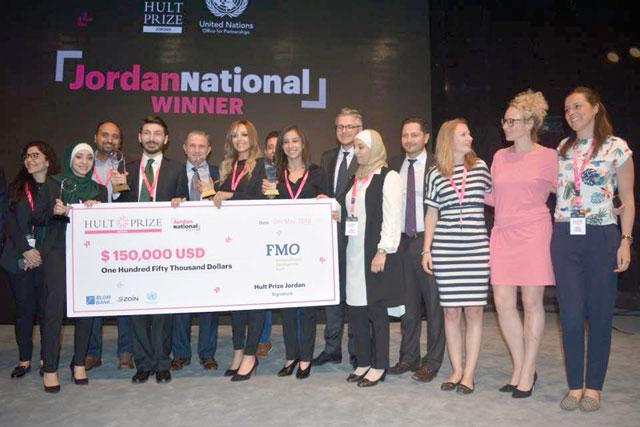You are here
Jordanian women eye int’l Hult Prize for their thermal energy formula
By Camille Dupire - Mar 27,2018 - Last updated at Mar 27,2018

The 'Here For Heat' team was one of the top 6 teams at the Hult Prize regionals in Melbourne, Australia (Photo courtesy of Ramah Abu Safieh)
AMMAN — Three Jordanian women have just returned from Melbourne, Australia, where they were selected as one of the top six teams nominated for the Hult Prize’s 2018 regional competition.
An annual, year-long competition running since 2010, the Hult Prize aims to crowd-source ideas from university students after challenging them to solve pressing social issues related to food security, water access, energy and education, according to its website.
Ramah Abu Safieh, a pharmacy student at the University of Petra, spoke to The Jordan Times on Monday as she returned from the regional finals where she and her teammates Shaden Thwieb and Duha Ghazi presented their innovative project of thermal energy formula.
“The idea behind our 'Here For Heat' team’s project was to serve the health sector in producing a safe pharmaceutical formula that generates thermal energy inside the human body in order to combat cold weather and increase the feeling of warmth,” Abu Safieh said, noting that the formula is made “only from natural plant extractions and is alcohol free”.
"Two years ago, I took part in the Atlantic Humanitarian Relief missions in Jordan that aims to provide medical relief and support services to the most vulnerable population including injured individuals, refugee women, children and the elderly," the young student recalled, noting that she witnessed the dramatic consequences of cold weather on these communities during winter.
“Our project aims to reduce the risk of hypothermia, support the traditional heating sources performance and reduce the complications caused by alcohol intake to feel warm in cold areas,” the team leader said, citing the danger of alcohol abuse by vulnerable population such as homeless people in countries with long cold winters or seasonal drops in temperature.
The project’s prototype, named “Hodka”, seeks to serve a large segment of people, specifically refugees, outdoor workers and people in vulnerable living settings.
This year’s challenge, which has been announced by former US president Bill Clinton, focuses on the theme of “harnessing the power of energy to transform the lives of 10 million people by 2025”, team member Thwieb said, noting that the solutions provided have to serve one of several fields including connectivity, education, health, mobility, water or agriculture.
The Jordanian “Here For Heat” participated in the Hult Prize 2018 — Petra University, where they seized the second place among 28 contestants, entitling them to move on to the regional finals at Melbourne Business School, where they were named as one of the top six teams.
One of the world’s biggest engine for the launch of innovative startups, the Hult Prize movement runs regional competitions in 15 cities, including Amman, around the world, as well as “Wild Card” rounds. The young women are expected to receive the official approval to take part in these rounds, which represent the “accelerator phase”.
Over the next eight weeks, the three Jordanians expect to undergo intensive start-up accelerator training at the UK Ashbridge Castle along with 49 other teams from around the globe.
Following this stage, six international teams will be selected to attend the global finals held at the UN headquarters in New York, where they will compete for the $1 million prize to be handed out by President Clinton as a capital investment for their innovation.
In the meantime, the “Here for Heat” team is preparing for the national finals to be held in May, a parallel process carried out simultaneously as part of the prize programme. They hope to seize the winning prize of $150,000, which will help them in developing their project to the next level, according to Ghazi
“Hult Prize was truly the turning point from being regular students to becoming social entrepreneurs,” said Abu Safieh, voicing her team’s hope to develop viable solutions for sustainable change.
“We are currently at the stage of conducting clinical trials and further developing our formula to achieve the safest, most effective and stable product with the help of experts in the labs of the Faculty of Pharmaceutical Studies at the University of Petra,” she concluded.
Related Articles
AMMAN — Thirty six teams from various Jordanian universities took part in the Hult Prize national competition held on May 4-5 at King Hussei
AMMAN — "It is not every day that you have an opportunity to change the world.
AMMAN — PartMan, a start-up founded by six students from Applied Science University, won the Hult Prize competition in Jordan on Friday, qua


















